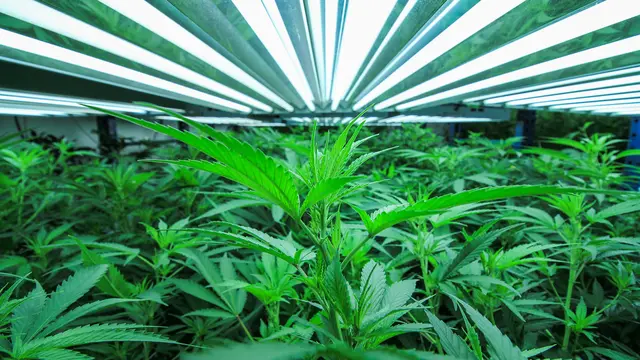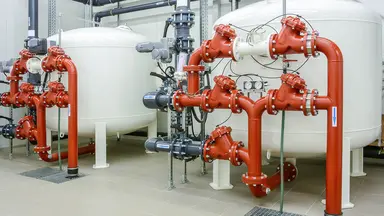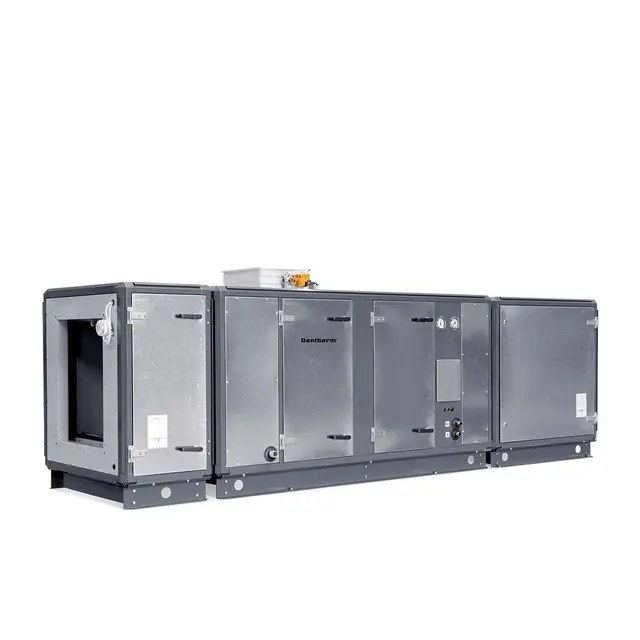The impact of uncontrolled humidity on cannabis growing

- Home
- Insights
- Humidity control and drying insights
- The impact of uncontrolled humidity on cannabis growing
Cannabis growing is a delicate arrangement, with careful humidity control essential to maximising a plant’s development across its lifespan. Discover why a dedicated dehumidification system is critical to the best possible returns on every crop.
Success in the cannabis industry is centred on one core factor: the quality and volume of the product yielded. If you work in this field, you will understand how hard a hit a weak, meagre harvest can hurt your bottom line and prevent you from reaping the full benefits of this €17 billion industry.
Consistency is critical, and with so many variables impacting cannabis growth, it is crucial cultivators have the systems in place to control these. One of the most important is the ability to manage humidity, protecting the plants from unwanted diseases and resulting in the most valuable, high-quality output.
Find out how important humidity factors into the cannabis growing process, and why a properly implemented Dantherm air handling unit is essential to ensuring the best results.
Cannabis and humidity: a delicate balance
Like any other living organism, cannabis is affected by the climate around it. And, like other plants, when it absorbs the water it needs to survive and grow, it will consistently transpire this as water vapour through their leaves.
This presents an issue as, if there is no system in place to extract that moisture from the air, the cannabis plant will continue to absorb this moisture, as well as any water it is receiving from the soil. Too much water can be as damaging as too little is for these crops, as we will discuss in further detail later in the article.
For plants like cannabis, this prevents humidity levels becoming too high or too low, and consequently keeping it at the conditions required for the fastest and best-quality output.
In addition, there is not one static humidity or temperature that cannabis needs to remain at for its entire growth. For the best produce, the plant requires different levels of relative humidity (RH) across its lifetime, which we have outlined below.
Typical temperature and humidity for cannabis growing stages
Life stage | Air temperature | Humidity |
| Seeding | 24 – 27°C | 65 – 70% |
| Vegetation | 24 – 27°C | 40 – 70% |
| Flowering | 24 – 27°C | 40 – 50% |
| Late flowering | 21 – 27°C | 30 – 50% |
| Drying | 21°C | 50% |
| Curing | 21°C | 62% |
The consequence of uncontrolled humidity on cannabis growing
The fluctuating needs of the cannabis plant in terms of humidity places a huge priority on a well-managed environment that continues to meet its ideal moisture levels throughout its growth.
That is why grow rooms, greenhouses and other indoor plant-growing facilities are used – to create a completely climate-controlled environment, helping to maximise plant production without the worry of external weather conditions changing.
But, if there is no dehumidification system in place to manage these conditions, it can lead to a number of nasty outcomes for your plants that affect their health, quality and yield.
- Bud rot (botrytis cinerea)
Bud rot is considered one of the primary “crop-killers” of cannabis. This is a mould that develops in the dense cores of cannabis buds. Infections begin on the bud stem and from there spread further outwards.
As a result, it is not easy to see bud rot with the naked eye early on. But once it has taken root, it destroys the surrounding bud, turning white, grey and finally black, as well as slimy and mushy. By then, it cannot be used anymore.
Most cultivators will cut out these infected areas and leave the remainder to grow. But, bud rot can lead to the plant spreading spores that go onto infecting the rest of the crop, so it is often safer to remove any infected plants entirely.
In either circumstance, if left unresolved, bud rot can lead to excessive yield reductions and profit losses for your cannabis growing. - White powdery mildew
Another potential problem is white powdery mildew, a fungal infection that develops in high-humidity environments. This can develop from standing water in proximity to a cannabis plant, and again damaging the overall health of it and the buds it is sprouting.
While the early stages of cannabis development require a high humidity environment, the presence of proper airflow from your dehumidification system will help prevent this growing and wreaking havoc on your harvest. - Nutrient deficiencies
When the air is too dry, plants will be compelled to drink through their roots to sustain themselves, especially in high temperatures. While this is great in moderation because of the nutrient-rich soil, overindulging in these nutrients can have negative implications.
This can cause the plants to develop yellow or burnt tips as a result of nutrient burn. Subsequently, the plants lose leaf mass and robustness, restricting their ability to absorb ‘food’ in the form of light into its system. Cannabis plants are particularly vulnerable to this during their flowering stage. - Restricted growth
Finally, above all else, if the humidity levels are not adjusted over time to best reflect the needs of the cannabis plant in its various phases, then it means the plant will not develop as fast or as healthily as it could be, reducing the quality of your output.
How Dantherm air handling units enhance cannabis production
To combat these concerns, Dantherm air handling units work to maintain ideal climate conditions for cannabis growing.
A properly designed climate control system enables you to fully control and maintain all the relevant factors and ensure constant air movement everywhere in your grow room or greenhouse to eliminate risks of mould, fungus and pests.
This keeps cannabis plants safe from harm and promotes an active climate that stimulates plant activity, leading to a stronger, high-volume output.
Using these units will allow you to:
Control day and nighttime humidity levels
Maintain CO2 levels at optimal conditions
Adjust the desired humidity in relation to the plant’s growth stage
Create the correct air flows and air changes in the facility
The choice of what system you use will depend on a variety of factors, including the number of plants housed in the area, the size and layout of your storage facility and your cannabis growing methods.
By selecting a Dantherm air handling unit, you will benefit from the experience and expertise of our engineers, who will assess your environment and provide the most fitting recommendation on what system you require and where it should be positioned to provide complete coverage over your product.
To learn more about our units and how they can affirm the quality and volume of your crops year-in and year-out, get in touch with our team.
Related products
Featured insights

Discover how to overcome the humidity challenges of preserving your artefacts

How does relative humidity affect your facility?

Preserving history from the constant threat of high humidity
Need help with choosing the right solution? Our team of over 100 climate control experts can assist.
You can also reach out or join the discussion on our Social Media. Check out our LinkedIn page.


